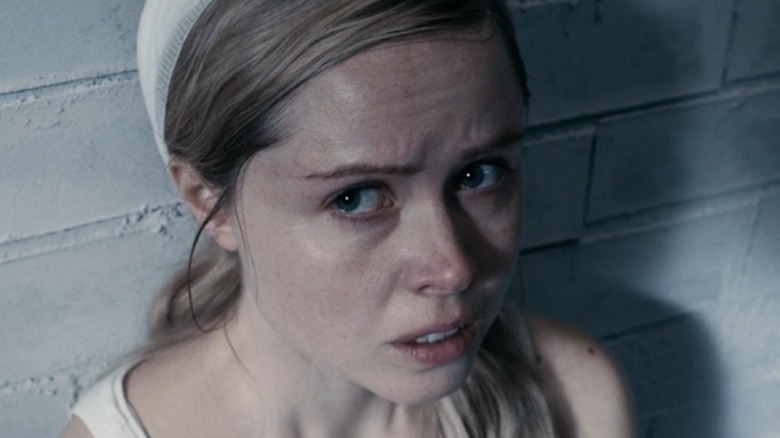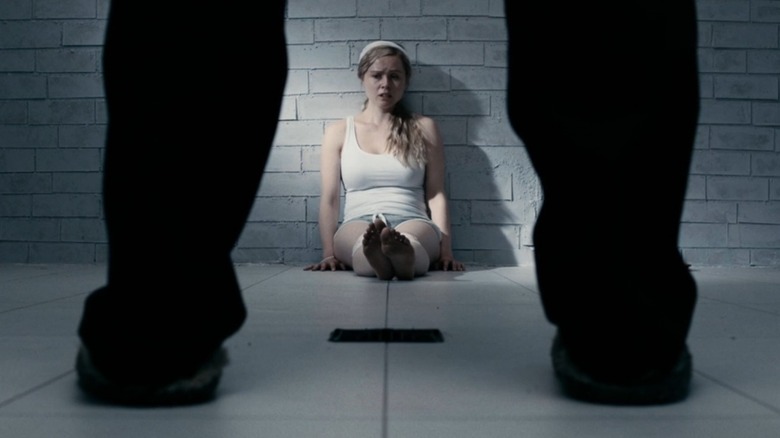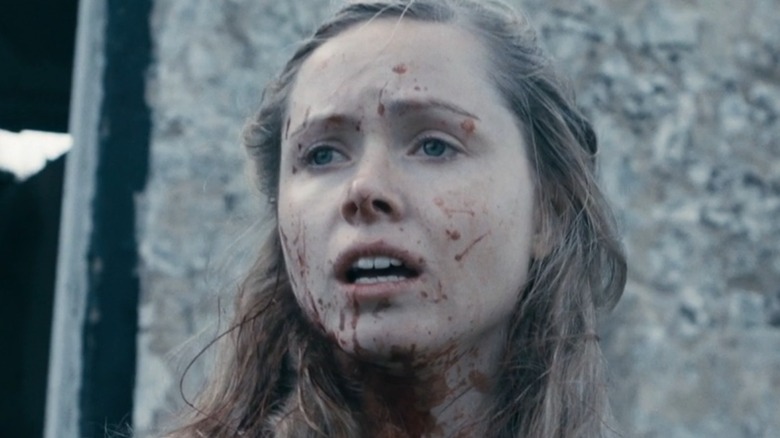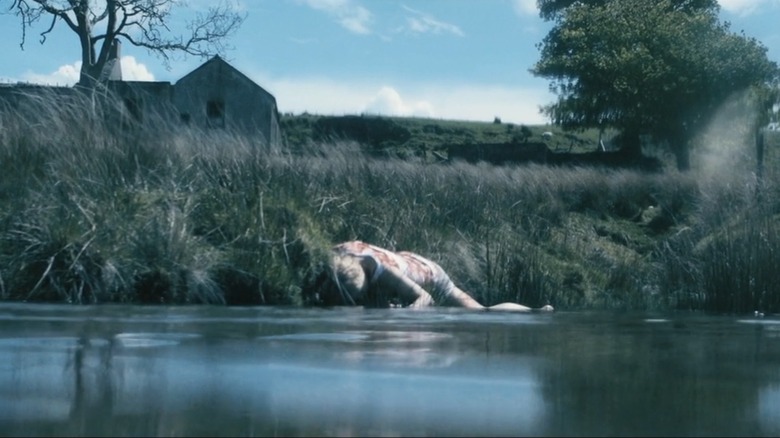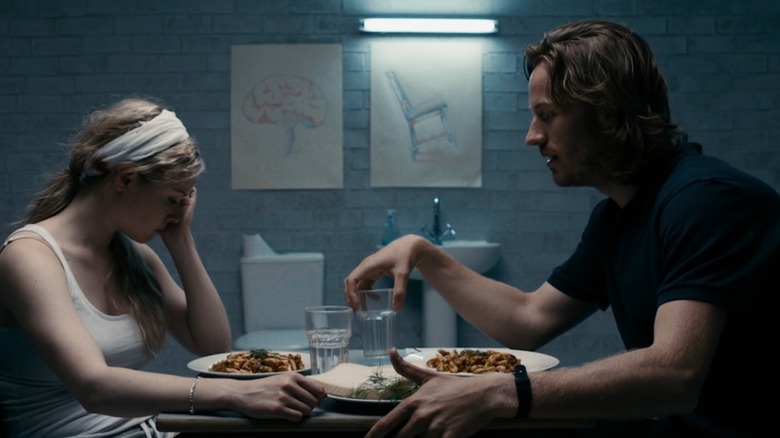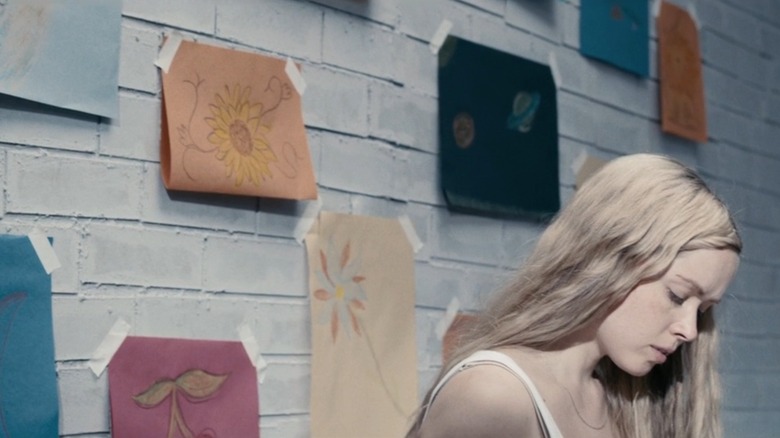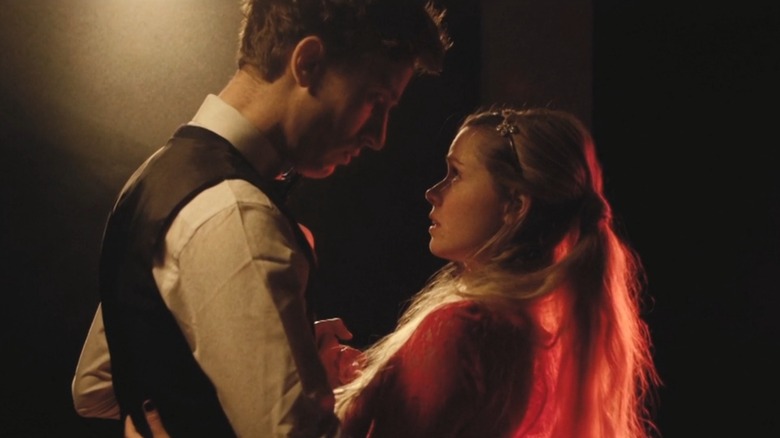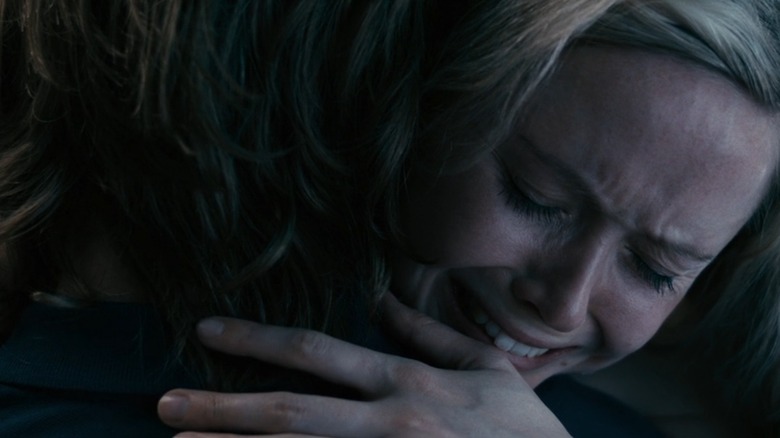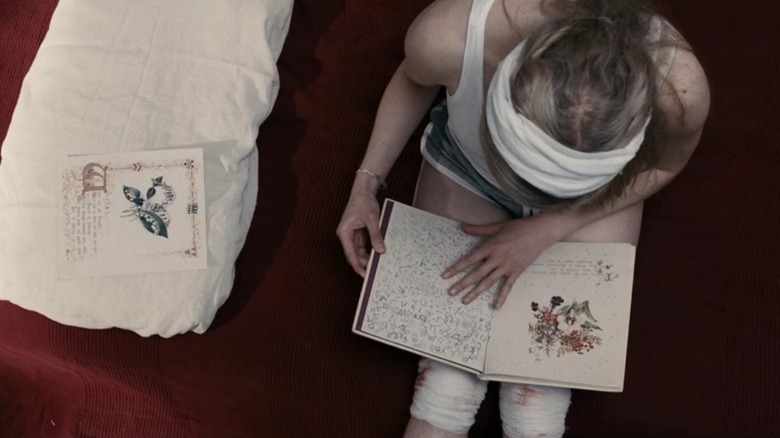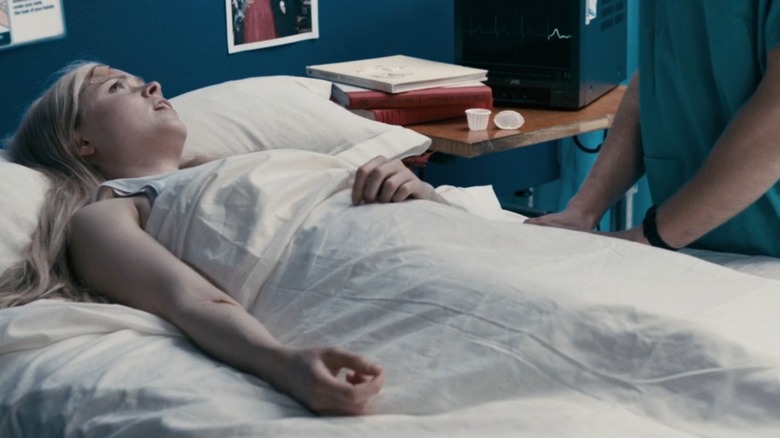The Ending Of Hippopotamus Explained
There were more than a handful of solid movies that blew people away in 2018, but even though blockbusters got a lion's share of the attention, there were some tiny indie movies released that year that did some major heavy lifting. Among them was "Hippopotamus," an unsettling debut from writer/director Edward Palmer.
The premise of "Hippopotamus" is fairly simple. Ruby (Ingvild Deila) has been kidnapped by Thomas (Stuart Mortimer), and he says he'll only let her go once she's fallen in love with him. But this isn't a movie like "365 Days," and by the time credits roll, romance will be far from your mind. As if the kidnapping weren't bad enough, Ruby also suffers from amnesia, and the more she starts to put together her past, the more terrifying her present situation becomes.
Like other great mind-benders, "Hippopotamus" is more about the questions it asks than the answers it provides. The film plays with time and memory, exploring the relationship between Ruby and Thomas — and by the end, you won't know who or what can be trusted. While "Hippopotamus" might warrant a second or even third viewing, before pressing "play" again it might prove helpful to read this breakdown of what it might all mean.
What to remember about the plot of Hippopotamus
If you've already finished the movie — and you should have, if you're reading this — you know the plot of "Hippopotamus" is anything but straightforward. The movie opens with Ruby walking up to find herself sitting in an eerily white basement, with bandages wrapped around her knees. Thomas is standing in the room in front of her; he explains that he has kidnapped her, severed the ligaments in her knees, and intends on keeping her prisoner until she falls in love with him.
To provide Ruby with some extra motivation to stay in place, Thomas says her legs will heal in time, but only if she doesn't use them now to try and escape. Over the next few days, Thomas brings Ruby food and painkillers, and he helps her with physical therapy exercises that might help heal her legs. Every time Ruby wakes up, Thomas explains the situation all over again, driving home the point that in addition to being a prisoner, Ruby suffers from amnesia.
Slowly, Ruby's memory stops falling apart every time she goes to sleep. She remembers who she is and why she's trapped in the basement. Ruby asks Thomas for a book to read during the day, and the one he brings triggers a memory of reading in a field. Ruby's surprised by the memory, but she's even more surprised by notes she finds hidden in the back of the book — clearly written by her.
What happened at the end of Hippopotamus
Ruby spends countless days in captivity. She appears to be warming up to Thomas, but it's clear that he's psychologically manipulating her. At night he plays a recording that essentially hypnotizes Ruby into believing her legs are injured, and during the day he talks to her about finding triggers to bring back her memories.
When Ruby seems to start warming up to him, Thomas finally explains what's really going on. He says the two of them were childhood friends who fell in love. One day, Thomas went to Ruby's apartment and found her roommate Nick raping her. In a blind rage, Thomas killed Nick. The trauma caused Ruby's amnesia, so Thomas took her away to a remote farmhouse, hoping to avoid the police and find a way to restore Ruby's memory.
Ruby's memories seem to come flooding back. She tells Thomas she loves him, and the two of them sleep together. In the morning, his watch alarm goes off, waking Ruby, and she grabs a small piece of glass and stabs him in the neck. She tries to escape the farmhouse in a canoe, but ends up nearly drowning. The movie concludes with Ruby once again trapped in the basement, which now looks like a hospital room. Thomas is posing as her doctor, and beginning the psychological manipulation all over again.
If you or anyone you know has been a victim of sexual assault, help is available. Visit the Rape, Abuse & Incest National Network website or contact RAINN's National Helpline at 1-800-656-HOPE (4673).
What was the importance of Ruby's dream?
Early in the movie, Ruby tells Thomas about a dream she keeps having during her nights trapped in the basement. In the dream, Ruby is sinking beneath the water, helpless to pull herself back up to air. She says she feels like something is coming to get her, but the dream ends before she's saved. Thomas says the dream sounds more like a nightmare, but Ruby insists that it's peaceful, and doesn't scare her in the slightest.
Ruby's dream really serves two purposes. For the movie's audience, the dream is a bit of foreshadowing. At the very end of the film, Ruby tries to escape from Thomas, but in the process falls into a lake and nearly drowns, just like she did in her dream. At that point, the viewer realizes that the reason the dream never scared Ruby is because she wants to be free, and she's even willing to die to escape the basement where Thomas has her locked away.
From Ruby's perspective, however, the dream might actually be a suppressed memory. There are more than a handful of hints throughout the film that we aren't seeing Ruby's story play out chronologically, and the dream is the linchpin of that theory. Unless Ruby suddenly gained the ability to see into the future, it seems likely the dream is actually her subconscious remembering a past escape attempt that Ruby forgets when her memory resets after sleeping too long.
Did Ruby and Thomas really date?
Thomas certainly makes it sound like he and Ruby once dated. He tells her he's been in love with her since they were children, and he even has a picture of the two of them at prom. About halfway through the movie, Thomas cooks a meal for Ruby that triggers one of her buried memories. In the memory, she and Thomas are eating at a fancy restaurant, and he gives her a necklace as a gift.
According to Thomas, that was their anniversary dinner. The implication is that the two of them were together for a long time, but there are some clear cracks in his story. For one thing, if Thomas and Ruby were dating for a long time, why did she end up living with her friend Nick? In a flashback sequence, his friend Rob takes him to Ruby's house and makes a joke about Ruby not letting Thomas inside "again."
The more you examine his version of events, the more suspect they become. It's entirely possible that Thomas and Ruby were actually childhood friends, but she might not have felt as strongly about Thomas as he did about her. Thomas comes across as being obsessive. He mentions their anniversary, but that could easily just be the anniversary of an important day in his memory, like when he first saw Ruby riding her bike and fell in love with her. In reality, Ruby and Thomas probably weren't together at all.
How much of his story is true?
Thanks in large part to Stuart Mortimer's performance, it's easy for the audience to begin trusting Thomas. In the version of events that he tells Ruby, he isn't a creepy stalker or a kidnapper, but actually a hero. He saved Ruby from Nick and all but sacrificed his normal life to try and restore her memory. It's a heartbreaking tale, to be sure — but some of the details don't add up.
Why was Ruby living with Nick if she and Thomas were together? Why did a friend make fun of his obsession with Ruby? How did Thomas manage to travel across the country with an incapacitated woman — on the run from the police — with no trouble whatsoever?
Thomas is a master manipulator. The audience knows this because we saw the elaborate methods he used to convince Ruby's subconscious that her legs were severely injured. He knows all about human psychology, and he uses special tricks (like the "triggers" he gives Ruby) to bend people to his will. In the movie's final shot, a grim-faced Thomas looks into the camera after leaving Ruby's fake hospital room. That's the first time the camera follows Thomas outside of the room, and it's the first time the audience gets to see Thomas drop his carefully-constructed facade. While it would be nice to believe that he's the hero of this story, Thomas is clearly its villain.
What does the title tell us about the story?
More often than not, a movie's title has something to say about the deeper meaning of the story. But like "Sorcerer," "Mother!," or "A Clockwork Orange," the title of "Hippopotamus" seems removed from what we're seeing on screen — but deeper sleuthing is rewarded.
There isn't a single hippo in this movie, and that's because the title is really code for something else. The film lays out what's going on near the end of the story about how Thomas and Ruby came to live at the abandoned farmhouse. He explains that he's trying to help Ruby get her memories back. At one point in his flashback, Ruby asks what's wrong with her hippopotamus – and he corrects her, pointing out that memory problems stem from a damaged hippocampus, the part of the brain responsible for creating long-term memories and regulating emotions.
So, there are two main ways to interpret the title, both tragic. From one perspective, the title could refer to the memory problems that Ruby suffered after Nick attacked her. In that interpretation, the movie is all about Thomas trying to help restore Ruby's "hippopotamus." On the other hand, the title could be pointing to the fact that Thomas is actively trying to manipulate Ruby's brain. All of his triggers and games are aimed at breaking Ruby's hippocampus, inserting memories where she's in love with him. It's a deeply chilling thought.
Is the whole movie secretly nonlinear?
Some parts of "Hippopotamus" feel scattered and disorganized, and that's by design. The movie more-or-less forces viewers into Ruby's perspective. Aside from a few brief shots, the entirety of the film takes place while Ruby is awake in the basement, figuring out her situation alongside the audience. That said, the movie doesn't just show confusing snippets of scenes for the sake of sowing chaos. There's good reason to believe that some of the scenes in "Hippopotamus" are shown out of order.
Ruby's dream hints toward this nonlinear reality. Early in the movie, she dreams about drowning, and at the end of the film she very nearly dies in a lake. It's possible that the movie's final moments actually took place at the beginning of the story. Ruby tries to escape but nearly drowns, and then Thomas resets her memory and tries to manipulate her all over again. That's potentially why Thomas is sniffling so much at the beginning of the movie — he caught a cold from being in the lake.
There are other hints, of course. A blink-and-you-miss-it shot shows Ruby stopped in a doorway by Thomas and injected with something that makes her pass out. That could very likely be one of his early attempts at messing with her brain. Also, when Ruby gets a book from Thomas, it's already filled with handwritten notes, implying she's been through this loop before. Much like Ruby, we can't trust what we experience in "Hippopotamus."
What's with that post credits soundbite?
It seems like ever since Nick Fury walked onscreen in 2008's "Iron Man," the entire movie business has become obsessed with stinger scenes. "Hippopotamus" doesn't sneak sequel bait into its credits, but it does hide a small detail for patient viewers that might shed light on the movie's shocking ending. Plus, the credits themselves actually tie into the ending. Rather than floating past a black screen, the credits are submerged in the water from Ruby's dream, which also happens to be how the movie set up its opening credits.
When all is said and done, the screen fades to black and a choked up voice whispers, "When you wake up" before the movie officially ends. It's obvious that the voice is speaking to Ruby, but it's hard to tell exactly whose voice it is. It sounds a little bit like Ruby herself, which could mean that the voice is a past version of Ruby desperately trying to get herself to hold onto some of her memories after sleeping.
However, if it's Thomas who is tearfully speaking to Ruby, then the theory that he was telling the truth all along holds a little more weight. Of course, it could just be Thomas trying a new manipulation tactic on Ruby. As with everything else in the movie, the questions raised by the ending soundbite are more compelling than any answers that might be revealed.
What has Edward Palmer said about the movie?
The real satisfaction in watching "Hippopotamus" is sitting with the questions the film leaves unanswered. There are any number of ways to interpret the story, and working through all the hints in the film is part of the fun. Because of that, writer/director Edward A. Palmer probably can't explain the entire movie without spoiling it for everyone, but that hasn't stopped him from offering a few hints as to what's really going on.
Speaking to an audience at the Ramsgate International Film Festival, Palmer said, "[The movie] looks like a Stockholm syndrome type of thing, but there's lots of, hopefully, twists and turns." If "Hippopotamus" is just a story about Stockholm syndrome, that would mean Thomas is without a doubt the bad guy, but all those twists and turns could take the story in a different direction. Palmer said that he wrote the movie with the hope that it would reward multiple viewings, encouraging audiences to piece together clues layered throughout the story.
For fans that just can't stand the mystery, Palmer has given more specific answers on TikTok. In the comments section on one of his videos, Palmer answered a question about Thomas by saying, "He MOSTLY tells the truth." Palmer wouldn't elaborate on which parts of his story were lies, however, so we're left to ponder that ourselves.
Why hasn't there been a sequel?
"Hippopotamus" debuted in 2018, so if there was ever going to be a sequel, it's overdue. The main movers behind the movie are all still quite active, and it seems like it would be pretty easy to reassemble them all.
Ingvild Deila has kept a busy schedule, acting in a few movies, TV shows, shorts, and even a video game. Her co-star Stuart Mortimer has starred in another film, and he worked with "Hippopotamus" writer/director Edward A. Palmer on the 2021 short "Nightingale." Palmer has primarily kept himself busy since 2018 working on other short films.
The truth is, "Hippopotamus" was never very likely to get a sequel. As a small indie film, it didn't have much chance of turning a huge profit, even though it did manage to get a bit of awards recognition from The Monthly Film Festival. Even if it had turned into a surprise financial success, it's unlikely that Palmer would have wanted to expand on the story. "Hippopotamus" is tightly structured and works so well because of the self-contained mystery at its core. It's not a story begging for a sequel, so all things considered, it's probably for the best if it ends up being a one-and-done.
